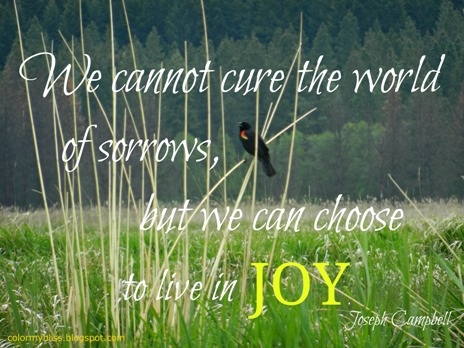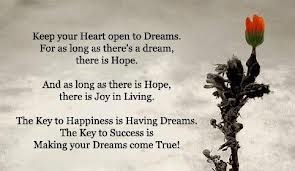
Neither in this world nor elsewhere is there any happiness in store for him who always doubts.


Monthly Archives: July 2013
Joy and sorrows
“Life and death, joy and sorrow, gain and loss; These dualities cannot be avoided. Learn to accept what you cannot change.”
Joy and sorrows-joy is sorrow,life is death;accept anekant
Joy Is Sorrow, Life Is Death: Accept Anekant
When knowledge or wisdom is absent, facts can be misused. If there is balance, such a situation does not arise. A balanced view takes into account as many aspects as possible. This is the anekanta principle.
The one who has perspective of anekanta does not take a single-dimensional view of things that could twist logic. In the explanation of universal laws anekanta has lent balance. Even in the world of conduct and thoughts, anekanta plays an important role. Restraint and equanimity are also results of ane-kanta. Without the anekanta view there would be no reason for restraint.
Through anekanta we accept the coexistence of opposites as a fact. Everything has its limits. There is need for equanimity. Both loss and gain are to be accepted. It is the norm that if there is gain there will also be loss and if there is loss, there will be gain, too.
The two are mutually connected. The two are, in fact, one. The difference is only in time or space. There is no distance between happiness and sorrow or life and death, they both go together. Sometimes one feels happy and life seems bright and sometimes one feels sad and life seems miserable. Where is the distance between water pulleys?
It is one single chain. The wheels bring in water, empty it and return. Wheels full of water and empty of water keep coming and going. They work together. Similarly, joy and sorrow work together. Life and death work together. There is no second that belongs entirely to life or entirely to death. The first second of life is also the first second of death. Death is not an event that is to take place only after 70-80 years. It can take place even in the first second. With the first second of birth the event of death also takes place. Creation and destruction go hand in hand. One cannot find even one man who has been only praised, never condemned, or always condemned and never praised. Both go together.
The balance is maintained. Loss and gain, praise and insults, life and death, all of them go together. We have a problem when we do not go along with them. If we learn to go along with them then we will be truly spiritual, followers of anekanta.
This way our problems come under our control. But we are very strange, we don’t usually adopt a balanced view. We do not like to move along with the principle of anekanta; we want to move independently. An individual wants gain but not loss, joy but not sorrow, life but not death, and he wants praise, never condemnation.
He then forgets the universal rule. In this dualistic world, nothing comes alone. Everything is in pairs. Man is ignorant. He wants to break the order of anekanta and wants only a single dimension. When the world and nature have a rule, how can it be broken? Yet man makes his own single-dimensional perspective. Under pressure of not wanting loss but wanting gain, not wanting insults but wanting praise, man falls victim to unidimensional perception. As told to Lalit Garg.
Joy and sorrows-song of the flower
“Song of the Flower”, by Kahlil Gibran
I am a kind word uttered and repeated
By the voice of Nature;
I am a star fallen from the
Blue tent upon the green carpet.
I am the daughter of the elements
With whom Winter conceived;
To whom Spring gave birth; I was
Reared in the lap of Summer and I
Slept in the bed of Autumn.
At dawn I unite with the breeze
To announce the coming of light;
At eventide I join the birds
In bidding the light farewell.
The plains are decorated with
My beautiful colors, and the air
Is scented with my fragrance.
As I embrace Slumber the eyes of
Night watch over me, and as I
Awaken I stare at the sun, which is
The only eye of the day.
I drink dew for wine, and hearken to
The voices of the birds, and dance
To the rhythmic swaying of the grass.
I am the lover’s gift; I am the wedding wreath;
I am the memory of a moment of happiness;
I am the last gift of the living to the dead;
I am a part of joy and a part of sorrow.
But I look up high to see only the light,
And never look down to see my shadow.
This is wisdom which man must learn.”
joy and sorrows

We cannot cure the world of sorrows ,but we can choose to live in joy.
Joy and sorrows

Who knows whither the clouds have fled?
In the unscarred heaven they leave no wake;
And the eyes forget the tears they have shed,
The heart forgets its sorrow and ache.
Let we dream of a joyful life
Infant joy and infant sorrows
Youth hopes and dreams
The world lies in the hands of those who have the courage to dream and who take the risk of living out their dreams – each according to his or her own talent.
Youth hopes and dreams
“First you have nothing, and then, astonishingly, after ripping out your brain and your heart and betraying your friends and ex-lovers and dreaming like a zombie over the page till you can’t see or hear or smell or taste, you have something.”
Youth,hopes and dreams
“Why Dream?
Life is a difficult assignment. We are fragile creatures, expected to function at high rates of speed, and asked to accomplish great and small things each day. These daily activities take enormous amounts of energy. Most things are out of our control. We are surrounded by danger, frustration, grief, and insanity as well as love, hope, ecstasy, and wonder. Being fully human is an exercise in humility, suffering, grace, and great humor. Things and people all around us die, get broken, or are lost. There is no safety or guarantees.
The way to accomplish the assignment of truly living is to engage fully, richly, and deeply in the living of your dreams. We are made to dream and to live those dreams.”
Youth ,hopes and dreams
Probably the happiest period in life most frequently is in middle age, when the eager passions of youth are cooled, and the infirmities of age not yet begun; as we see that the shadows, which are at morning and evening so large, almost entirely disappear at midday
Youth hopes and dreams

Youth,hopes and dreams
– To be conscious that we are perceiving or thinking is to be conscious of our own existence.
Youth ,hopes and dreams
Everybody has a creative potential and from the moment you can express this creative potential, you can start changing the world.
Paulo Coelho
Youth,hopes and dreams
Youth is a beautiful dream, on whose brightness books shed a blinding dust. Will ever the day come when the wise link the joy of knowledge to youth’s dream? Will ever the day come when Nature becomes the teacher of man, humanity his book and life his school? Youth’s joyous purpose cannot be fulfilled until that day comes. Too slow is our march toward spiritual elevation, because we make so little use of youth’s ardor.
Kahlil Gibran (1883 – 1931)
On joy and sorrow ; By Khalil Gibran
Your joy is your sorrow unmasked.
And the selfsame well from which your laughter rises was oftentimes filled with your tears.
And how else can it be?
The deeper that sorrow carves into your being, the more joy you can contain.
Is not the cup that holds your wine the very cup that was burned in the potter’s oven?
And is not the lute that soothes your spirit, the very wood that was hollowed with knives?
When you are joyous, look deep into your heart and you shall find it is only that which has given you sorrow that is giving you joy.
When you are sorrowful look again in your heart, and you shall see that in truth you are weeping for that which has been your delight.
Some of you say, “Joy is greater thar sorrow,” and others say, “Nay, sorrow is the greater.”
But I say unto you, they are inseparable.
Together they come, and when one sits, alone with you at your board, remember that the other is asleep upon your bed.
Verily you are suspended like scales between your sorrow and your joy.
Only when you are empty are you at standstill and balanced.
When the treasure-keeper lifts you to weigh his gold and his silver, needs must your joy or your sorrow rise or fall.

@rajatkumar1069…
@rajatkumar1069: “While money can’t buy happiness, it certainly lets you choose your own form of misery.”
Can money be considered more important in the modern world.

